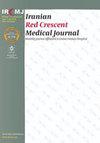Preventive Behaviors, Psychological Distress, and their Associated Factors in Iranians during the SARS-CoV-2 Delta Variant Outbreak
IF 0.2
4区 医学
引用次数: 0
Abstract
Background: Up to now, the severe acute respiratory syndrome coronavirus 2 (SARS-CoV-2) has affected and killed millions of people across the globe. In these conditions, Iran was experiencing the fifth wave of the Coronavirus disease 2019 (COVID-19) pandemic, accrued by the Delta variant, over the course of the present study. Objectives: The present study aimed to reflect on preventive behaviors, psychological distress, and their associated factors in Iranians during the SARS-CoV-2 Delta variant outbreak. Methods: Utilizing a descriptive-analytical cross-sectional research design, this study was performed on 1,015 Iranian individuals referred to the comprehensive healthcare centers in Kashan, central Iran, selected via simple random sampling. Data collection tools included the sociodemographic information questionnaire, the Preventive Behaviors against COVID-19 Questionnaire (PBCQ), and the 12-item General Health Questionnaire (GHQ-12). Results: The study results revealed that the mean±standard deviation (SD) of PBCQ was 17.20±4.18 (12-36). In addition, involvement in preventive behaviors against COVID-19 was at higher levels in male (P=0.007), younger (P≤0.001), and self-employed (P=0.016) participants with a fair family economic status (P=0.007), as compared to other cases. Those receiving no vaccines (P=0.023), together with the subjects recently contracting COVID-19, also adhered to only some preventive behaviors (P≤0.001). The GHQ-12 mean±SD was equal to 2.15±2.41 (0-12). Moreover, the study results indicated that female (P=0.021) younger (P=0.017), married (P=0.024), self-employed (P=0.003) subjects with a fair or poor family economic status (P=0.001) and recent infection with COVID-19 (P=0.010) were more susceptible to psychological distress, as compared to others. Conclusion: The present study demonstrated that engagement in preventive behaviors against COVID-19 significantly dwindled, and the incidence rate of psychological distress augmented in the course of the fifth wave of the pandemic in Iranians. These findings could provide healthcare planners and policymakers with valuable information.伊朗人在 SARS-CoV-2 Delta 变异爆发期间的预防行为、心理压力及其相关因素
背景:迄今为止,严重急性呼吸系统综合征冠状病毒 2(SARS-CoV-2)已影响并导致全球数百万人死亡。在这种情况下,伊朗正在经历第五波冠状病毒病 2019(COVID-19)大流行,由三角洲变种累积而成。 研究目的本研究旨在反映 SARS-CoV-2 Delta 变体爆发期间伊朗人的预防行为、心理困扰及其相关因素。 研究方法本研究采用描述性分析横断面研究设计,通过简单随机抽样,在伊朗中部卡尚市的综合医疗保健中心选取了 1,015 名伊朗人作为研究对象。数据收集工具包括社会人口信息问卷、COVID-19 预防行为问卷 (PBCQ) 和 12 项一般健康问卷 (GHQ-12)。 结果显示研究结果显示,PBCQ 的平均值为(17.20±4.18)(12-36),标准差为(SD)。此外,与其他病例相比,男性(P=0.007)、年轻(P≤0.001)、自营职业(P=0.016)且家庭经济状况良好(P=0.007)的参与者参与 COVID-19 预防行为的水平更高。未接种疫苗的受试者(P=0.023)和最近感染 COVID-19 的受试者也只坚持了一些预防行为(P≤0.001)。GHQ-12 平均值(±SD)为 2.15±2.41(0-12)。此外,研究结果表明,与其他人相比,女性(P=0.021)、年轻(P=0.017)、已婚(P=0.024)、自营职业(P=0.003)、家庭经济状况一般或较差(P=0.001)、近期感染 COVID-19 (P=0.010)的受试者更容易受到心理困扰。 结论本研究表明,在第五波大流行过程中,伊朗人对 COVID-19 的预防行为参与度明显下降,心理困扰发生率上升。这些研究结果可为医疗保健规划者和决策者提供有价值的信息。
本文章由计算机程序翻译,如有差异,请以英文原文为准。
求助全文
约1分钟内获得全文
求助全文
来源期刊

Iranian Red Crescent Medical Journal
医学-医学:内科
自引率
0.00%
发文量
0
期刊介绍:
The IRANIAN RED CRESCENT MEDICAL JOURNAL is an international, English language, peer-reviewed journal dealing with general Medicine and Surgery, Disaster Medicine and Health Policy. It is an official Journal of the Iranian Hospital Dubai and is published monthly. The Iranian Red Crescent Medical Journal aims at publishing the high quality materials, both clinical and scientific, on all aspects of Medicine and Surgery
 求助内容:
求助内容: 应助结果提醒方式:
应助结果提醒方式:


